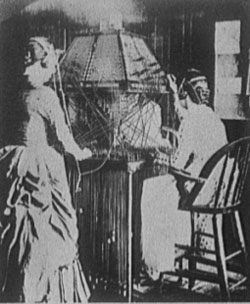He Says, She Says
 Yesterday's Wired Campus of the Chronicle of Higher Education contained a story about a study about gender differences regarding web use. What is interesting about the study is that it, like many studies about gender difference, shows that the difference is primarily in self-description or narration rather than actual digital practice.
Yesterday's Wired Campus of the Chronicle of Higher Education contained a story about a study about gender differences regarding web use. What is interesting about the study is that it, like many studies about gender difference, shows that the difference is primarily in self-description or narration rather than actual digital practice."Not a single woman among all our female study subjects called herself an 'expert' user, while not a single male ranked himself as a complete novice or 'not at all skilled,'" noted Hargittai, a sociologist by training whose research at Northwestern focuses on the social and policy implications of information technology and the ways in which technology can contribute to or alleviate social inequalities.
As someone who knows plenty of "girl geeks," I was doubtful about the validity of these results, but then the article explained the second component of the study.
In 2001 and 2002, Hargittai observed in person and screen-captured in audio and visual files 100 randomly chosen subjects from New Jersey’s Mercer County as they engaged in a variety of assigned online tasks. The tasks included finding career or job information, accessing examples of children's art, locating tax forms, finding a car for purchase and listening to music online.
Of the 100 subjects aged 18 to 81 and with differing Internet experience and representing diverse occupations (real estate agents, service workers, medical professionals, office workers, students, retired individuals, teachers, unemployed people, policy analysts and blue collar workers), 49 subjects were male and 51 were female. Some reported using the Internet only a few minutes a week; others said they spent several hours online every day.
Overall, the success rate for completing the tasks was 84 percent. Most (94.3 percent) were able to find a museum site. Fewer than 3 out of 5, however, mastered what was found to be the most difficult of the tasks -- locating a Web site comparing the abortion positions of different candidates in the 2000 presidential election. Although users were given as much time as they needed to successfully complete each assigned task, no single task was successfully completed by all of the 100 study subjects.
In this part of the study, women displayed "essentially equivalent skillls."
Controlling for age, education and family income, and using in-person observation as well as traditional survey measures of skill, the researchers found that gender was NOT a significant predictor of efficient and effective online ability. Level of education, age and Internet experience, on the other hand, were meaningful predictors.
So why the difference in self-reporting? Apparently, the classic "he says, she says" problem is to blame. For example, my colleague Jenny Cool notes that men and women tend to tell their life stories very differently when asked about their career choices. Women tend to emphasize the role of chance and circumstance in choosing their careers and make finding their present job sound circuitous, while men tend to organize their stories around claims that they always wanted their chosen careers and that their lives were remarkably direct and efficient at reaching that goal. The irony? When you compare the actual narratives, men's lives were just as dictated by accident and outside forces as women's.
Furthermore, keep in mind that many of the first "computers" were women, when it was a job title rather than a piece of equipment. (See Nurturing the Network: Women and the Communications Industry for more historical fun facts.)
You can trace the Internet gender difference team's work back to a paper on "From Unequal Access to Differentiated Use: A Literature Review and Agenda for Research on Digital Inequality" (from an interesting Princeton working papers series on cultural policy).
One of the researchers, Eszter Hargittai, maintains a number of interesting indie websites outside of her academic page from the university: her personal home page, her blog (which has some good DIY stuff and links to freeware), and even a list of "how-to's" for novice academics. For example, it is interesting to read about how she reflects upon the media's twist and spin on her study. She is a genuine girl geek, by the way, because she knows her Erdös Number, which I don't.
Labels: feminism

0 Comments:
Post a Comment
<< Home